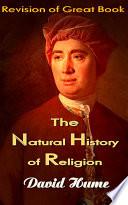Quotes from work
The Natural History of Religion

The Natural History of Religion Section I.: That Polytheism was the primary Religion of Men. Section II.: Origin of Polytheism. Section III.: The same subject continued. Section IV.: Deities not considered as Creators or Formers of the World. Section V.: Various Forms of Polytheism: Allegory, Hero-Worship. Section VI.: Origin of Theism from Polytheism. Section VII.: Confirmation of this Doctrine. Section VIII.: Flux and Reflux of Polytheism and Theism. Section IX.: Comparison of these Religions with regard to Persecution and Toleration. Section X.: With regard to Courage or Abasement. Section XI.: With regard to Reason or Absurdity. Section XII.: With regard to Doubt or Conviction. Section XIII.: Impious conceptions of the divine nature in popular religions of both kinds. Section XIV.: Bad influence of popular religions on morality. Section XV.: General Corollary.

Part XV - General corollary
The Natural History of Religion (1757)
Context: Hear the verbal protestations of all men: Nothing so certain as their religious tenets. Examine their lives: You will scarcely think that they repose the smallest confidence in them. The greatest and truest zeal gives us no security against hypocrisy: The most open impiety is attended with a secret dread and compunction. No theological absurdities so glaring that they have not, sometimes, been embraced by men of the greatest and most cultivated understanding. No religious precepts so rigorous that they have not been adopted by the most voluptuous and most abandoned of men.

Part XV - General corollary
The Natural History of Religion (1757)
Context: What a noble privilege is it of human reason to attain the knowledge of the supreme Being; and, from the visible works of nature, be enabled to infer so sublime a principle as its supreme Creator? But turn the reverse of the medal. Survey most nations and most ages. Examine the religious principles, which have, in fact, prevailed in the world. You will scarcely be persuaded, that they are any thing but sick men's dreams: Or perhaps will regard them more as the playsome whimsies of monkies in human shape, than the serious, positive, dogmatical asseverations of a being, who dignifies himself with the name of rational.

Part XV - General corollary
The Natural History of Religion (1757)
Context: The more exquisite any good is, of which a small specimen is afforded us, the sharper is the evil, allied to it; and few exceptions are found to this uniform law of nature. The most sprightly wit borders on madness; the highest effusions of joy produce the deepest melancholy; the most ravishing pleasures are attended with the most cruel lassitude and disgust; the most flattering hopes make way for the severest disappointments. And, in general, no course of life has such safety (for happiness is not to be dreamed of) as the temperate and moderate, which maintains, as far as possible, a mediocrity, and a kind of insensibility, in every thing. As the good, the great, the sublime, the ravishing are found eminently in the genuine principles of theism; it may be expected, from the analogy of nature, that the base, the absurd, the mean, the terrifying will be equally discovered in religious fictions and chimeras.

Part XV - General corollary
The Natural History of Religion (1757)
Context: The universal propensity to believe in invisible, intelligent power, if not an original instinct, being at least a general attendant of human nature, may be considered as a kind of mark or stamp, which the divine workman has set upon his work; and nothing surely can more dignify mankind, than to be thus selected from all other parts of the creation, and to bear the image or impression of the universal Creator. But consult this image, as it appears in the popular religions of the world. How is the deity disfigured in our representations of him! What caprice, absurdity, and immorality are attributed to him! How much is he degraded even below the character, which we should naturally, in common life, ascribe to a man of sense and virtue!

Part XV - General corollary
The Natural History of Religion (1757)
Context: The whole is a riddle, an aenigma, an inexplicable mystery. Doubt, uncertainty, suspence of judgment appear the only result of our most accurate scrutiny, concerning this subject. But such is the frailty of human reason, and such the irresistible contagion of opinion, that even this deliberate doubt could scarcely be upheld; did we not enlarge our view, and opposing one species of superstition to another, set them a quarrelling; while we ourselves, during their fury and contention, happily make our escape, into the calm, though obscure, regions of philosophy.